MAR023-6: Thriving in Global Environment: Zalando's Market Report
VerifiedAdded on 2023/06/03
|27
|7607
|177
Report
AI Summary
This individual report assesses Zalando's potential global expansion into Turkey, UAE, and Egypt, focusing on determining the most suitable market and devising an effective market entry strategy. It examines the investment environment, market potential, and government policies in each country. For Turkey, it highlights its competitive environment, strong industrial culture, and favorable business conditions, while also noting the effects of government interventionist policies and regional integration initiatives. In the UAE, the report discusses significant FDI inflows, government support for business, and potential challenges like foreign ownership restrictions and legal transparency. The analysis includes Porter’s Five Forces for the fashion accessories and apparel industry in Turkey, assessing the threat of new entry, supplier power, substitution, buyer power, and competitive rivalry. Ultimately, the report aims to provide Zalando with a comprehensive understanding of the opportunities and risks associated with each market, enabling informed decision-making for its global expansion plans. Desklib provides access to similar solved assignments and resources for students.
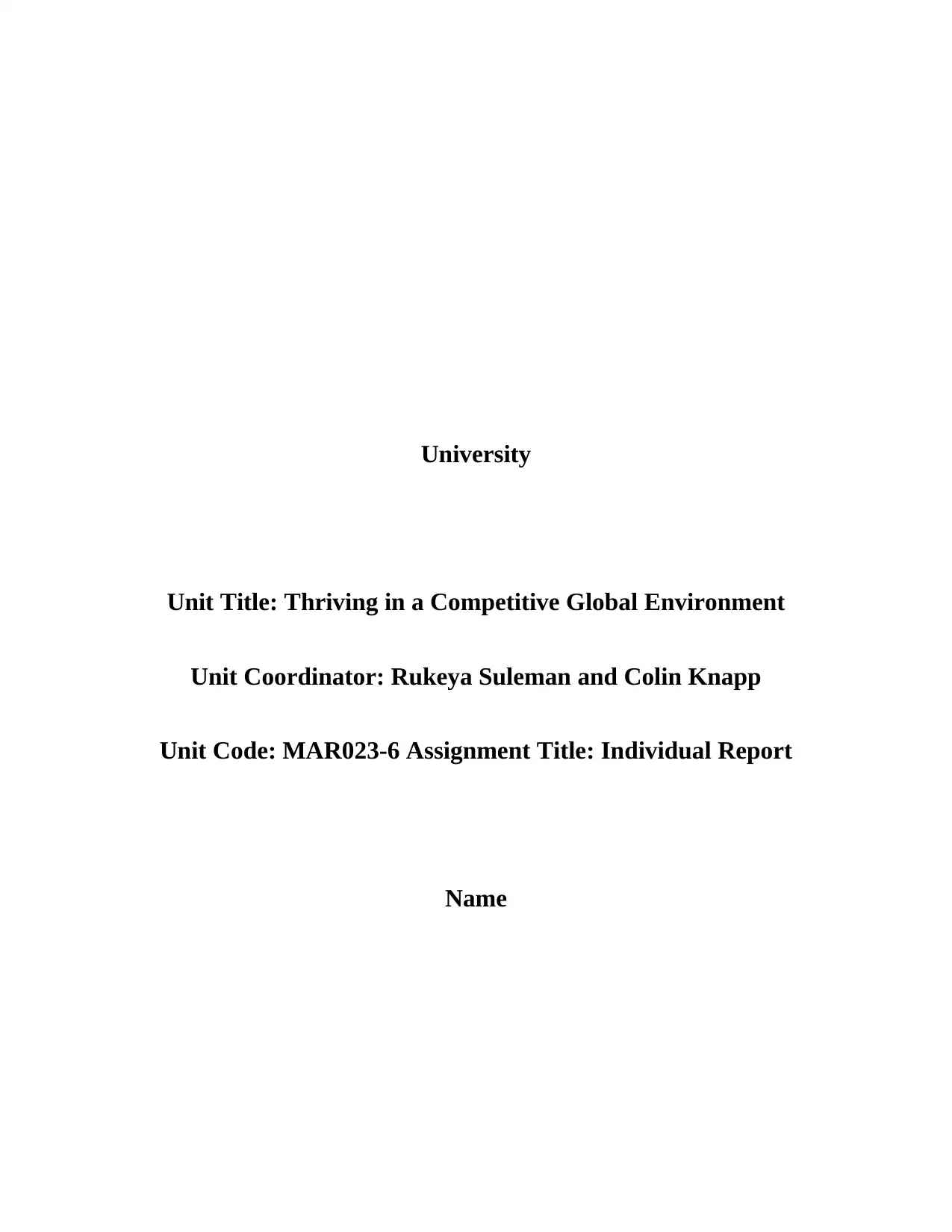
University
Unit Title: Thriving in a Competitive Global Environment
Unit Coordinator: Rukeya Suleman and Colin Knapp
Unit Code: MAR023-6 Assignment Title: Individual Report
Name
Unit Title: Thriving in a Competitive Global Environment
Unit Coordinator: Rukeya Suleman and Colin Knapp
Unit Code: MAR023-6 Assignment Title: Individual Report
Name
Paraphrase This Document
Need a fresh take? Get an instant paraphrase of this document with our AI Paraphraser
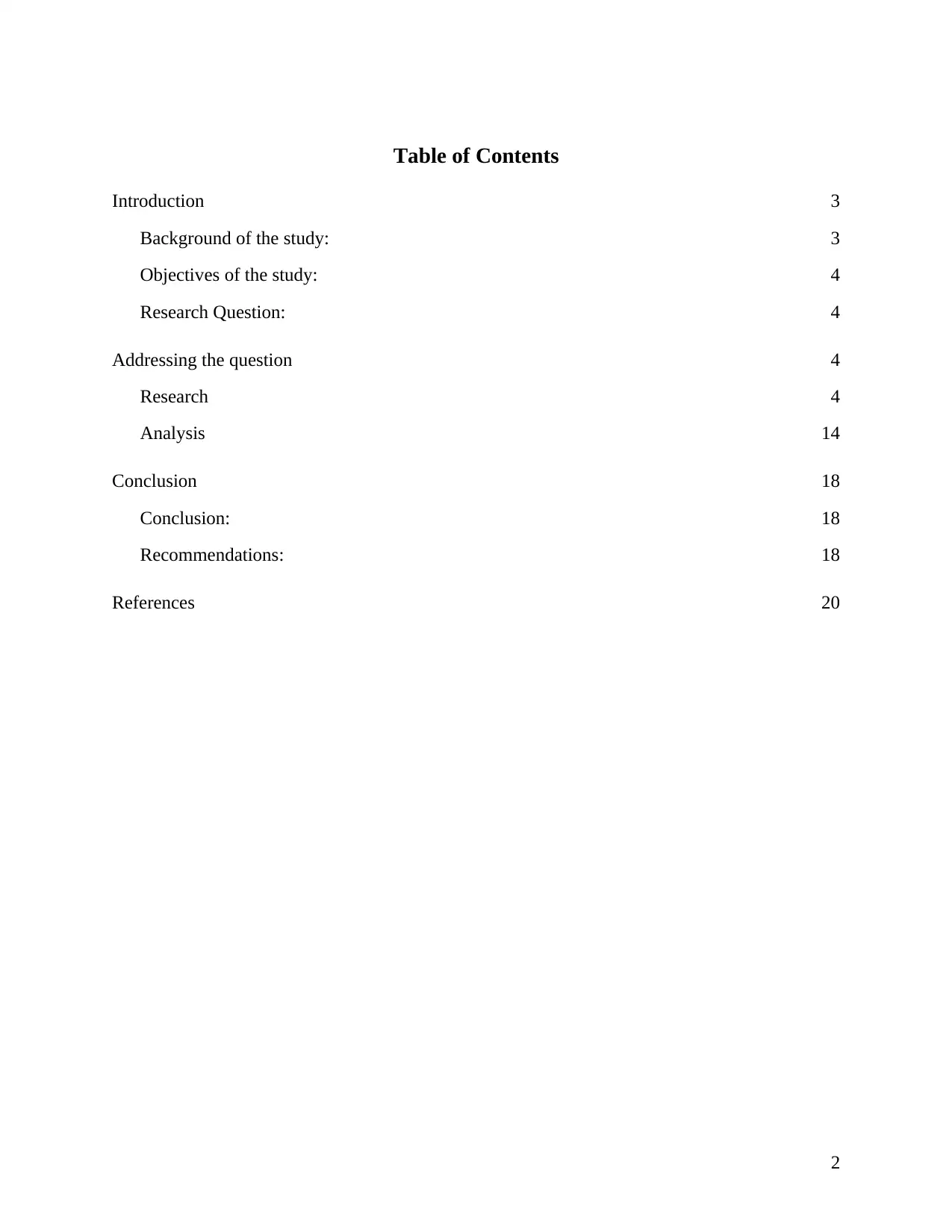
Table of Contents
Introduction 3
Background of the study: 3
Objectives of the study: 4
Research Question: 4
Addressing the question 4
Research 4
Analysis 14
Conclusion 18
Conclusion: 18
Recommendations: 18
References 20
2
Introduction 3
Background of the study: 3
Objectives of the study: 4
Research Question: 4
Addressing the question 4
Research 4
Analysis 14
Conclusion 18
Conclusion: 18
Recommendations: 18
References 20
2
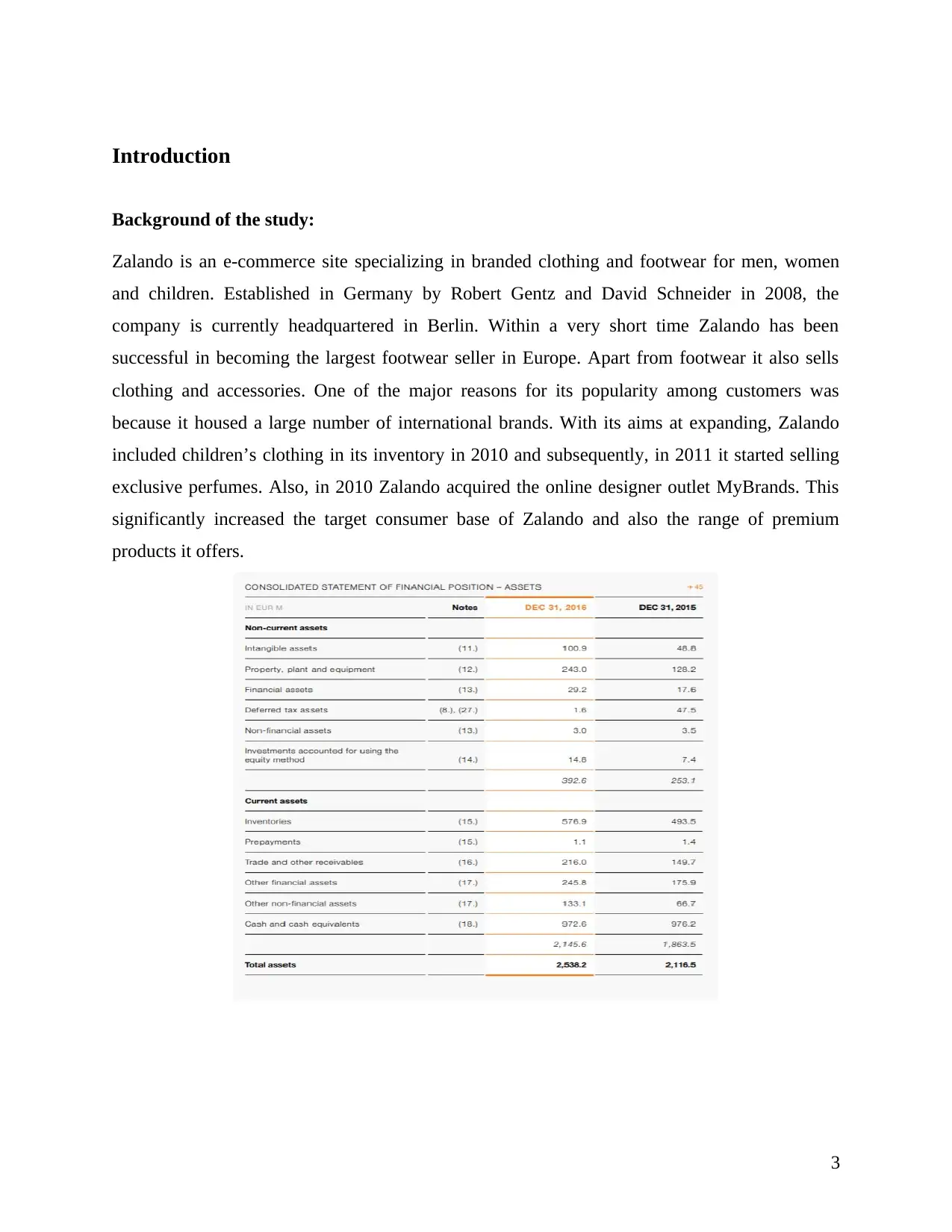
Introduction
Background of the study:
Zalando is an e-commerce site specializing in branded clothing and footwear for men, women
and children. Established in Germany by Robert Gentz and David Schneider in 2008, the
company is currently headquartered in Berlin. Within a very short time Zalando has been
successful in becoming the largest footwear seller in Europe. Apart from footwear it also sells
clothing and accessories. One of the major reasons for its popularity among customers was
because it housed a large number of international brands. With its aims at expanding, Zalando
included children’s clothing in its inventory in 2010 and subsequently, in 2011 it started selling
exclusive perfumes. Also, in 2010 Zalando acquired the online designer outlet MyBrands. This
significantly increased the target consumer base of Zalando and also the range of premium
products it offers.
3
Background of the study:
Zalando is an e-commerce site specializing in branded clothing and footwear for men, women
and children. Established in Germany by Robert Gentz and David Schneider in 2008, the
company is currently headquartered in Berlin. Within a very short time Zalando has been
successful in becoming the largest footwear seller in Europe. Apart from footwear it also sells
clothing and accessories. One of the major reasons for its popularity among customers was
because it housed a large number of international brands. With its aims at expanding, Zalando
included children’s clothing in its inventory in 2010 and subsequently, in 2011 it started selling
exclusive perfumes. Also, in 2010 Zalando acquired the online designer outlet MyBrands. This
significantly increased the target consumer base of Zalando and also the range of premium
products it offers.
3
⊘ This is a preview!⊘
Do you want full access?
Subscribe today to unlock all pages.

Trusted by 1+ million students worldwide
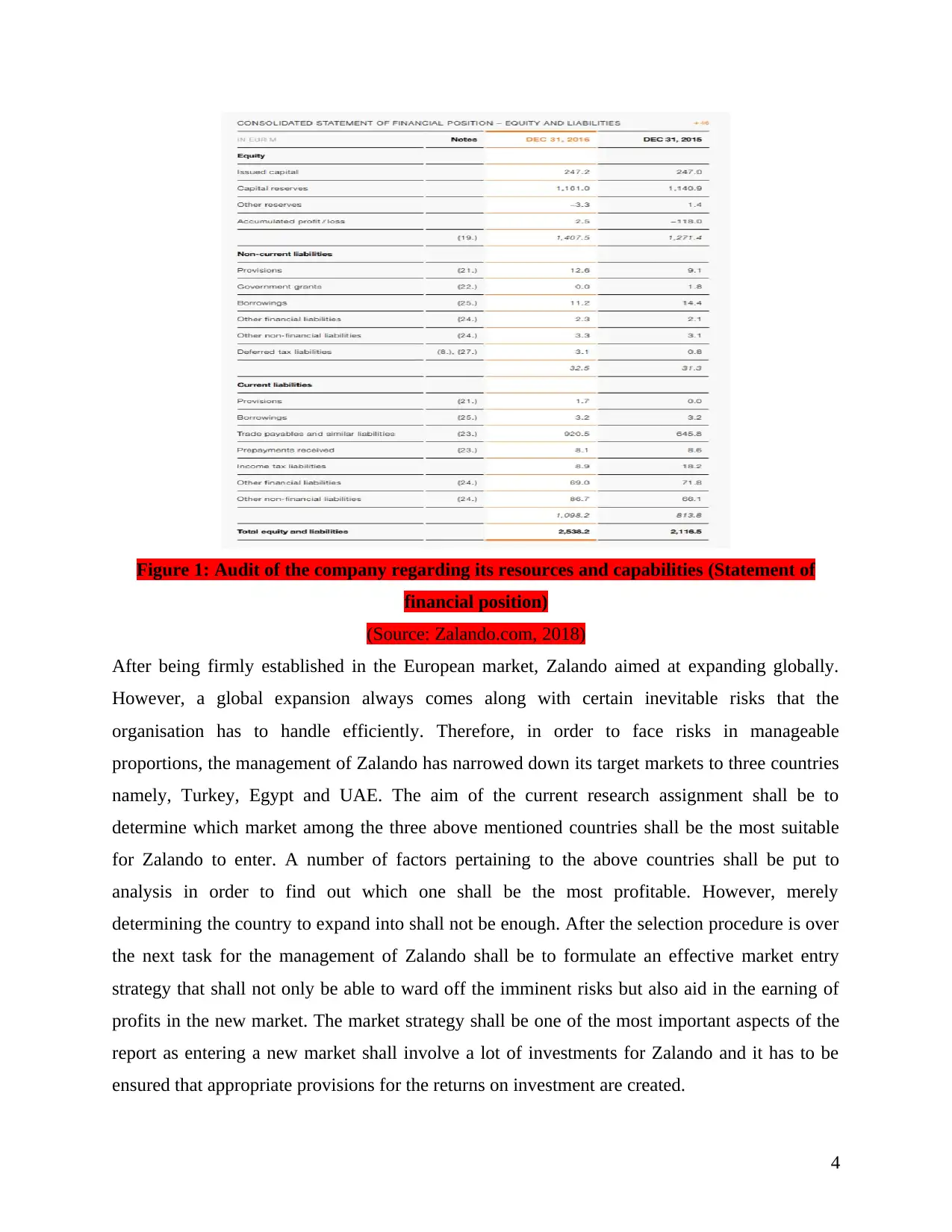
Figure 1: Audit of the company regarding its resources and capabilities (Statement of
financial position)
(Source: Zalando.com, 2018)
After being firmly established in the European market, Zalando aimed at expanding globally.
However, a global expansion always comes along with certain inevitable risks that the
organisation has to handle efficiently. Therefore, in order to face risks in manageable
proportions, the management of Zalando has narrowed down its target markets to three countries
namely, Turkey, Egypt and UAE. The aim of the current research assignment shall be to
determine which market among the three above mentioned countries shall be the most suitable
for Zalando to enter. A number of factors pertaining to the above countries shall be put to
analysis in order to find out which one shall be the most profitable. However, merely
determining the country to expand into shall not be enough. After the selection procedure is over
the next task for the management of Zalando shall be to formulate an effective market entry
strategy that shall not only be able to ward off the imminent risks but also aid in the earning of
profits in the new market. The market strategy shall be one of the most important aspects of the
report as entering a new market shall involve a lot of investments for Zalando and it has to be
ensured that appropriate provisions for the returns on investment are created.
4
financial position)
(Source: Zalando.com, 2018)
After being firmly established in the European market, Zalando aimed at expanding globally.
However, a global expansion always comes along with certain inevitable risks that the
organisation has to handle efficiently. Therefore, in order to face risks in manageable
proportions, the management of Zalando has narrowed down its target markets to three countries
namely, Turkey, Egypt and UAE. The aim of the current research assignment shall be to
determine which market among the three above mentioned countries shall be the most suitable
for Zalando to enter. A number of factors pertaining to the above countries shall be put to
analysis in order to find out which one shall be the most profitable. However, merely
determining the country to expand into shall not be enough. After the selection procedure is over
the next task for the management of Zalando shall be to formulate an effective market entry
strategy that shall not only be able to ward off the imminent risks but also aid in the earning of
profits in the new market. The market strategy shall be one of the most important aspects of the
report as entering a new market shall involve a lot of investments for Zalando and it has to be
ensured that appropriate provisions for the returns on investment are created.
4
Paraphrase This Document
Need a fresh take? Get an instant paraphrase of this document with our AI Paraphraser
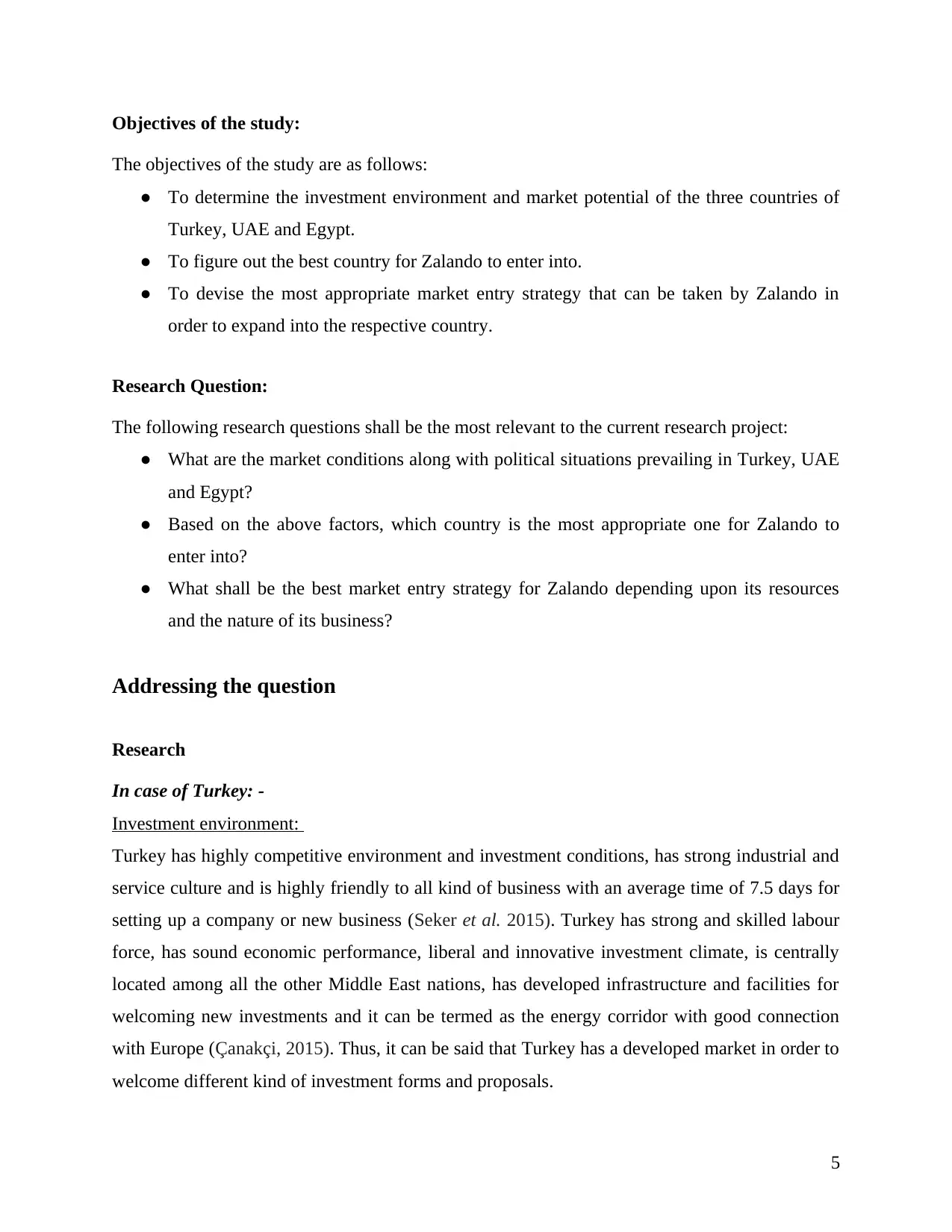
Objectives of the study:
The objectives of the study are as follows:
● To determine the investment environment and market potential of the three countries of
Turkey, UAE and Egypt.
● To figure out the best country for Zalando to enter into.
● To devise the most appropriate market entry strategy that can be taken by Zalando in
order to expand into the respective country.
Research Question:
The following research questions shall be the most relevant to the current research project:
● What are the market conditions along with political situations prevailing in Turkey, UAE
and Egypt?
● Based on the above factors, which country is the most appropriate one for Zalando to
enter into?
● What shall be the best market entry strategy for Zalando depending upon its resources
and the nature of its business?
Addressing the question
Research
In case of Turkey: -
Investment environment:
Turkey has highly competitive environment and investment conditions, has strong industrial and
service culture and is highly friendly to all kind of business with an average time of 7.5 days for
setting up a company or new business (Seker et al. 2015). Turkey has strong and skilled labour
force, has sound economic performance, liberal and innovative investment climate, is centrally
located among all the other Middle East nations, has developed infrastructure and facilities for
welcoming new investments and it can be termed as the energy corridor with good connection
with Europe (Çanakçi, 2015). Thus, it can be said that Turkey has a developed market in order to
welcome different kind of investment forms and proposals.
5
The objectives of the study are as follows:
● To determine the investment environment and market potential of the three countries of
Turkey, UAE and Egypt.
● To figure out the best country for Zalando to enter into.
● To devise the most appropriate market entry strategy that can be taken by Zalando in
order to expand into the respective country.
Research Question:
The following research questions shall be the most relevant to the current research project:
● What are the market conditions along with political situations prevailing in Turkey, UAE
and Egypt?
● Based on the above factors, which country is the most appropriate one for Zalando to
enter into?
● What shall be the best market entry strategy for Zalando depending upon its resources
and the nature of its business?
Addressing the question
Research
In case of Turkey: -
Investment environment:
Turkey has highly competitive environment and investment conditions, has strong industrial and
service culture and is highly friendly to all kind of business with an average time of 7.5 days for
setting up a company or new business (Seker et al. 2015). Turkey has strong and skilled labour
force, has sound economic performance, liberal and innovative investment climate, is centrally
located among all the other Middle East nations, has developed infrastructure and facilities for
welcoming new investments and it can be termed as the energy corridor with good connection
with Europe (Çanakçi, 2015). Thus, it can be said that Turkey has a developed market in order to
welcome different kind of investment forms and proposals.
5
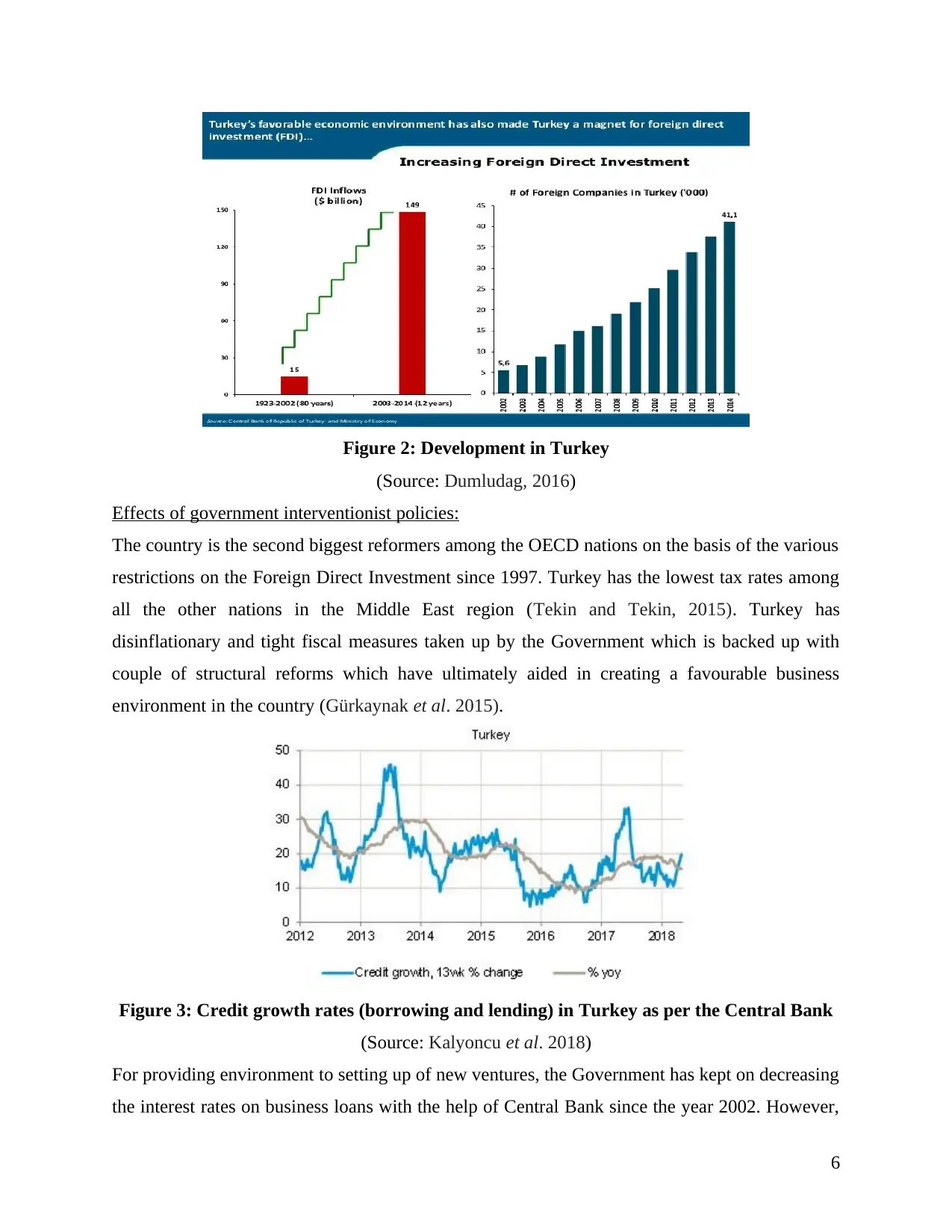
Figure 2: Development in Turkey
(Source: Dumludag, 2016)
Effects of government interventionist policies:
The country is the second biggest reformers among the OECD nations on the basis of the various
restrictions on the Foreign Direct Investment since 1997. Turkey has the lowest tax rates among
all the other nations in the Middle East region (Tekin and Tekin, 2015). Turkey has
disinflationary and tight fiscal measures taken up by the Government which is backed up with
couple of structural reforms which have ultimately aided in creating a favourable business
environment in the country (Gürkaynak et al. 2015).
Figure 3: Credit growth rates (borrowing and lending) in Turkey as per the Central Bank
(Source: Kalyoncu et al. 2018)
For providing environment to setting up of new ventures, the Government has kept on decreasing
the interest rates on business loans with the help of Central Bank since the year 2002. However,
6
(Source: Dumludag, 2016)
Effects of government interventionist policies:
The country is the second biggest reformers among the OECD nations on the basis of the various
restrictions on the Foreign Direct Investment since 1997. Turkey has the lowest tax rates among
all the other nations in the Middle East region (Tekin and Tekin, 2015). Turkey has
disinflationary and tight fiscal measures taken up by the Government which is backed up with
couple of structural reforms which have ultimately aided in creating a favourable business
environment in the country (Gürkaynak et al. 2015).
Figure 3: Credit growth rates (borrowing and lending) in Turkey as per the Central Bank
(Source: Kalyoncu et al. 2018)
For providing environment to setting up of new ventures, the Government has kept on decreasing
the interest rates on business loans with the help of Central Bank since the year 2002. However,
6
⊘ This is a preview!⊘
Do you want full access?
Subscribe today to unlock all pages.

Trusted by 1+ million students worldwide
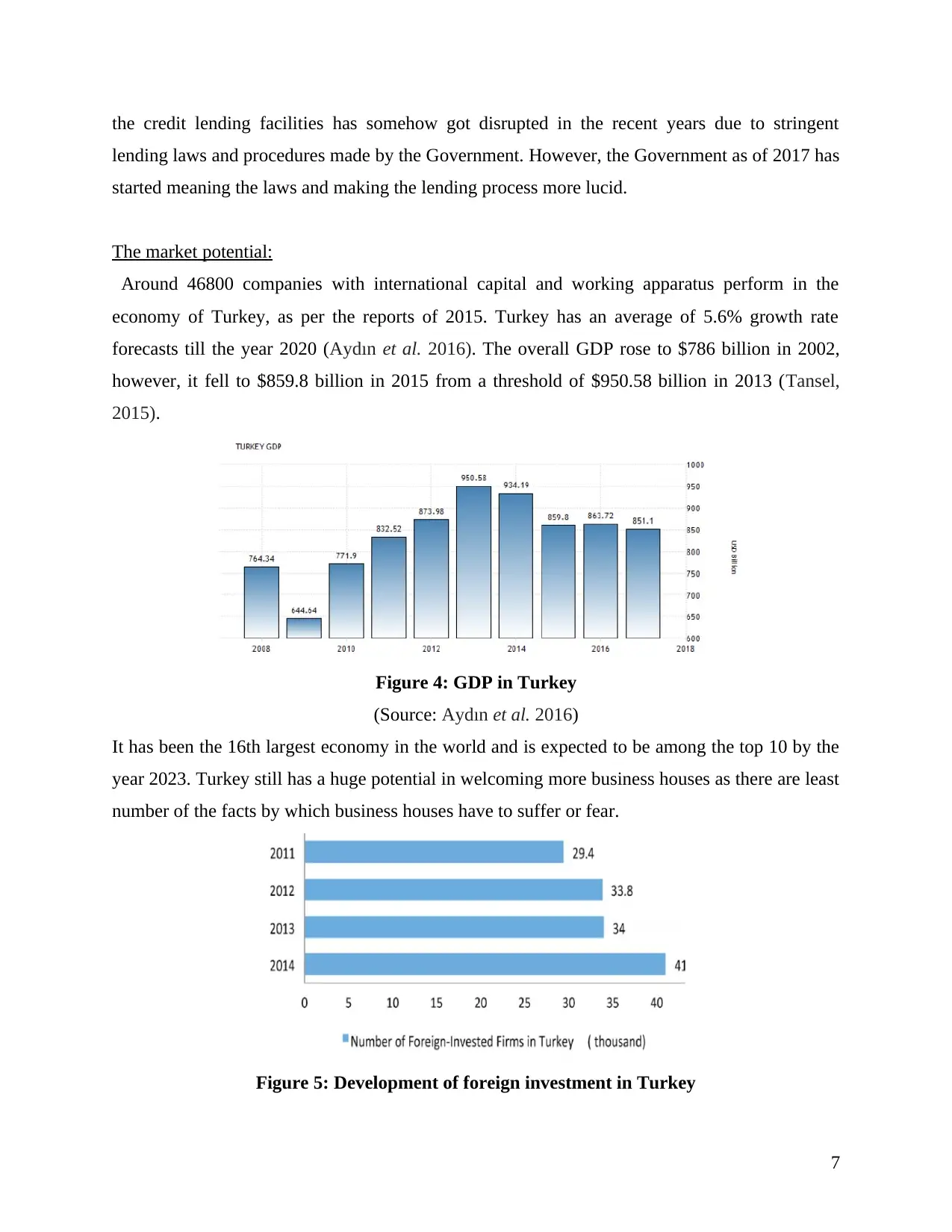
the credit lending facilities has somehow got disrupted in the recent years due to stringent
lending laws and procedures made by the Government. However, the Government as of 2017 has
started meaning the laws and making the lending process more lucid.
The market potential:
Around 46800 companies with international capital and working apparatus perform in the
economy of Turkey, as per the reports of 2015. Turkey has an average of 5.6% growth rate
forecasts till the year 2020 (Aydın et al. 2016). The overall GDP rose to $786 billion in 2002,
however, it fell to $859.8 billion in 2015 from a threshold of $950.58 billion in 2013 (Tansel,
2015).
Figure 4: GDP in Turkey
(Source: Aydın et al. 2016)
It has been the 16th largest economy in the world and is expected to be among the top 10 by the
year 2023. Turkey still has a huge potential in welcoming more business houses as there are least
number of the facts by which business houses have to suffer or fear.
Figure 5: Development of foreign investment in Turkey
7
lending laws and procedures made by the Government. However, the Government as of 2017 has
started meaning the laws and making the lending process more lucid.
The market potential:
Around 46800 companies with international capital and working apparatus perform in the
economy of Turkey, as per the reports of 2015. Turkey has an average of 5.6% growth rate
forecasts till the year 2020 (Aydın et al. 2016). The overall GDP rose to $786 billion in 2002,
however, it fell to $859.8 billion in 2015 from a threshold of $950.58 billion in 2013 (Tansel,
2015).
Figure 4: GDP in Turkey
(Source: Aydın et al. 2016)
It has been the 16th largest economy in the world and is expected to be among the top 10 by the
year 2023. Turkey still has a huge potential in welcoming more business houses as there are least
number of the facts by which business houses have to suffer or fear.
Figure 5: Development of foreign investment in Turkey
7
Paraphrase This Document
Need a fresh take? Get an instant paraphrase of this document with our AI Paraphraser
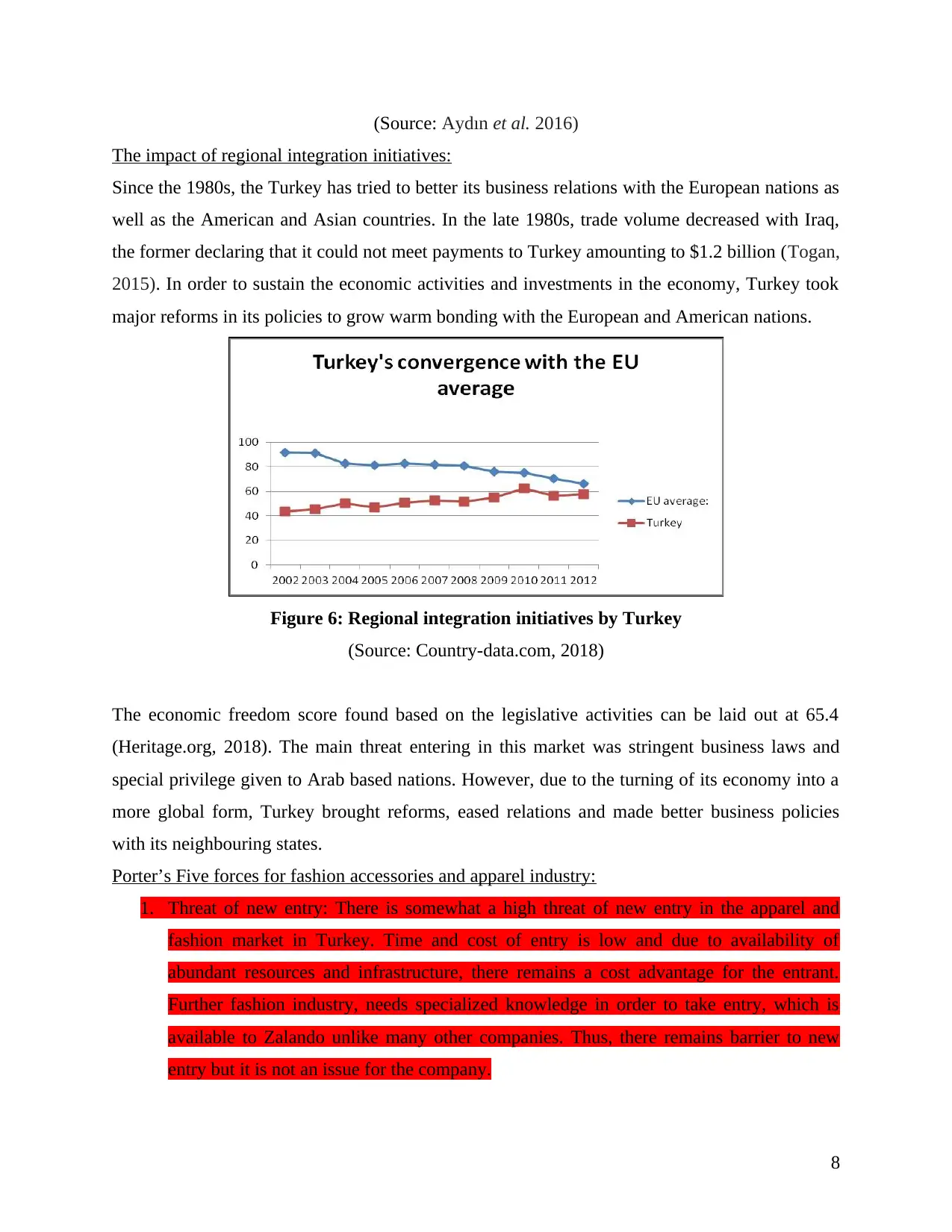
(Source: Aydın et al. 2016)
The impact of regional integration initiatives:
Since the 1980s, the Turkey has tried to better its business relations with the European nations as
well as the American and Asian countries. In the late 1980s, trade volume decreased with Iraq,
the former declaring that it could not meet payments to Turkey amounting to $1.2 billion (Togan,
2015). In order to sustain the economic activities and investments in the economy, Turkey took
major reforms in its policies to grow warm bonding with the European and American nations.
Figure 6: Regional integration initiatives by Turkey
(Source: Country-data.com, 2018)
The economic freedom score found based on the legislative activities can be laid out at 65.4
(Heritage.org, 2018). The main threat entering in this market was stringent business laws and
special privilege given to Arab based nations. However, due to the turning of its economy into a
more global form, Turkey brought reforms, eased relations and made better business policies
with its neighbouring states.
Porter’s Five forces for fashion accessories and apparel industry:
1. Threat of new entry: There is somewhat a high threat of new entry in the apparel and
fashion market in Turkey. Time and cost of entry is low and due to availability of
abundant resources and infrastructure, there remains a cost advantage for the entrant.
Further fashion industry, needs specialized knowledge in order to take entry, which is
available to Zalando unlike many other companies. Thus, there remains barrier to new
entry but it is not an issue for the company.
8
The impact of regional integration initiatives:
Since the 1980s, the Turkey has tried to better its business relations with the European nations as
well as the American and Asian countries. In the late 1980s, trade volume decreased with Iraq,
the former declaring that it could not meet payments to Turkey amounting to $1.2 billion (Togan,
2015). In order to sustain the economic activities and investments in the economy, Turkey took
major reforms in its policies to grow warm bonding with the European and American nations.
Figure 6: Regional integration initiatives by Turkey
(Source: Country-data.com, 2018)
The economic freedom score found based on the legislative activities can be laid out at 65.4
(Heritage.org, 2018). The main threat entering in this market was stringent business laws and
special privilege given to Arab based nations. However, due to the turning of its economy into a
more global form, Turkey brought reforms, eased relations and made better business policies
with its neighbouring states.
Porter’s Five forces for fashion accessories and apparel industry:
1. Threat of new entry: There is somewhat a high threat of new entry in the apparel and
fashion market in Turkey. Time and cost of entry is low and due to availability of
abundant resources and infrastructure, there remains a cost advantage for the entrant.
Further fashion industry, needs specialized knowledge in order to take entry, which is
available to Zalando unlike many other companies. Thus, there remains barrier to new
entry but it is not an issue for the company.
8
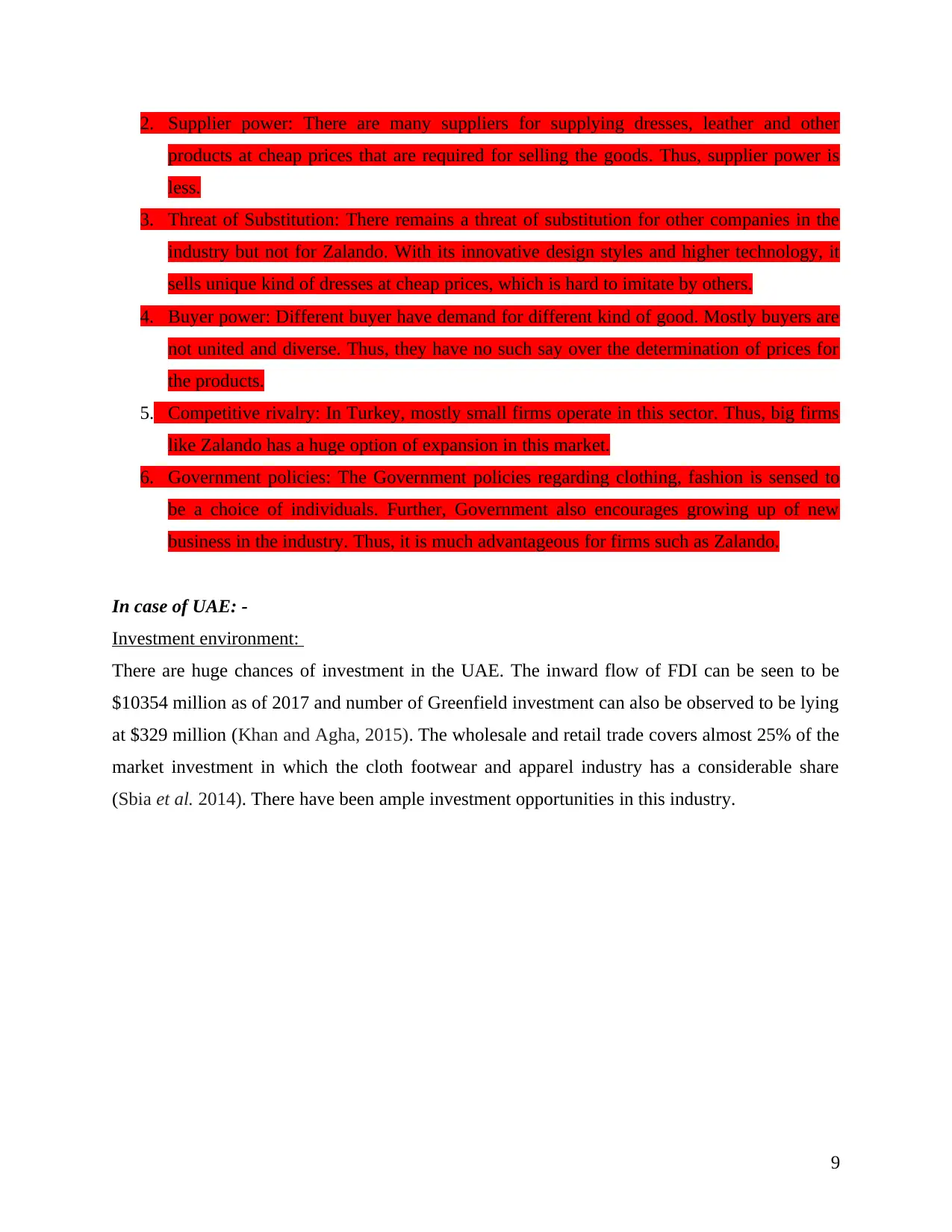
2. Supplier power: There are many suppliers for supplying dresses, leather and other
products at cheap prices that are required for selling the goods. Thus, supplier power is
less.
3. Threat of Substitution: There remains a threat of substitution for other companies in the
industry but not for Zalando. With its innovative design styles and higher technology, it
sells unique kind of dresses at cheap prices, which is hard to imitate by others.
4. Buyer power: Different buyer have demand for different kind of good. Mostly buyers are
not united and diverse. Thus, they have no such say over the determination of prices for
the products.
5. Competitive rivalry: In Turkey, mostly small firms operate in this sector. Thus, big firms
like Zalando has a huge option of expansion in this market.
6. Government policies: The Government policies regarding clothing, fashion is sensed to
be a choice of individuals. Further, Government also encourages growing up of new
business in the industry. Thus, it is much advantageous for firms such as Zalando.
In case of UAE: -
Investment environment:
There are huge chances of investment in the UAE. The inward flow of FDI can be seen to be
$10354 million as of 2017 and number of Greenfield investment can also be observed to be lying
at $329 million (Khan and Agha, 2015). The wholesale and retail trade covers almost 25% of the
market investment in which the cloth footwear and apparel industry has a considerable share
(Sbia et al. 2014). There have been ample investment opportunities in this industry.
9
products at cheap prices that are required for selling the goods. Thus, supplier power is
less.
3. Threat of Substitution: There remains a threat of substitution for other companies in the
industry but not for Zalando. With its innovative design styles and higher technology, it
sells unique kind of dresses at cheap prices, which is hard to imitate by others.
4. Buyer power: Different buyer have demand for different kind of good. Mostly buyers are
not united and diverse. Thus, they have no such say over the determination of prices for
the products.
5. Competitive rivalry: In Turkey, mostly small firms operate in this sector. Thus, big firms
like Zalando has a huge option of expansion in this market.
6. Government policies: The Government policies regarding clothing, fashion is sensed to
be a choice of individuals. Further, Government also encourages growing up of new
business in the industry. Thus, it is much advantageous for firms such as Zalando.
In case of UAE: -
Investment environment:
There are huge chances of investment in the UAE. The inward flow of FDI can be seen to be
$10354 million as of 2017 and number of Greenfield investment can also be observed to be lying
at $329 million (Khan and Agha, 2015). The wholesale and retail trade covers almost 25% of the
market investment in which the cloth footwear and apparel industry has a considerable share
(Sbia et al. 2014). There have been ample investment opportunities in this industry.
9
⊘ This is a preview!⊘
Do you want full access?
Subscribe today to unlock all pages.

Trusted by 1+ million students worldwide
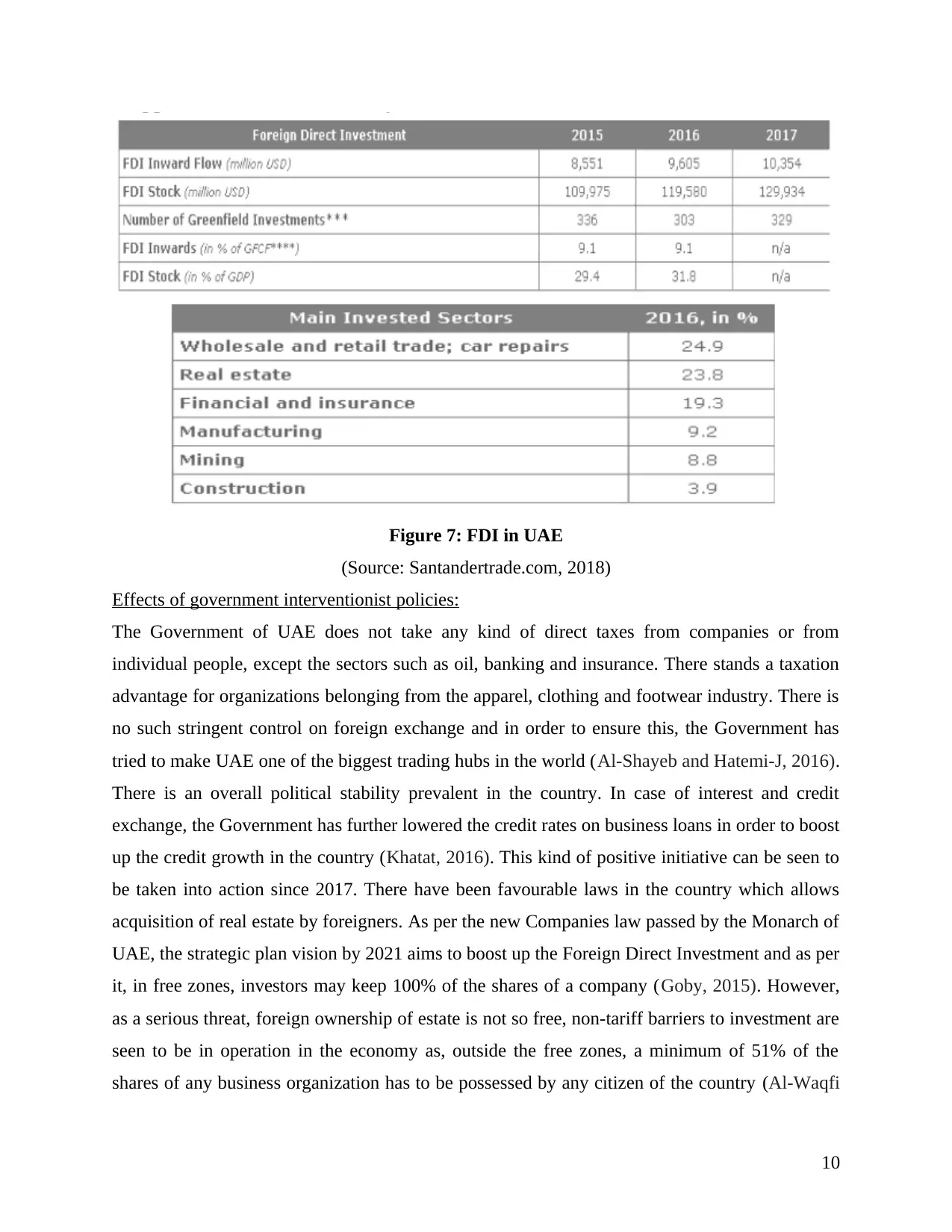
Figure 7: FDI in UAE
(Source: Santandertrade.com, 2018)
Effects of government interventionist policies:
The Government of UAE does not take any kind of direct taxes from companies or from
individual people, except the sectors such as oil, banking and insurance. There stands a taxation
advantage for organizations belonging from the apparel, clothing and footwear industry. There is
no such stringent control on foreign exchange and in order to ensure this, the Government has
tried to make UAE one of the biggest trading hubs in the world (Al-Shayeb and Hatemi-J, 2016).
There is an overall political stability prevalent in the country. In case of interest and credit
exchange, the Government has further lowered the credit rates on business loans in order to boost
up the credit growth in the country (Khatat, 2016). This kind of positive initiative can be seen to
be taken into action since 2017. There have been favourable laws in the country which allows
acquisition of real estate by foreigners. As per the new Companies law passed by the Monarch of
UAE, the strategic plan vision by 2021 aims to boost up the Foreign Direct Investment and as per
it, in free zones, investors may keep 100% of the shares of a company (Goby, 2015). However,
as a serious threat, foreign ownership of estate is not so free, non-tariff barriers to investment are
seen to be in operation in the economy as, outside the free zones, a minimum of 51% of the
shares of any business organization has to be possessed by any citizen of the country (Al-Waqfi
10
(Source: Santandertrade.com, 2018)
Effects of government interventionist policies:
The Government of UAE does not take any kind of direct taxes from companies or from
individual people, except the sectors such as oil, banking and insurance. There stands a taxation
advantage for organizations belonging from the apparel, clothing and footwear industry. There is
no such stringent control on foreign exchange and in order to ensure this, the Government has
tried to make UAE one of the biggest trading hubs in the world (Al-Shayeb and Hatemi-J, 2016).
There is an overall political stability prevalent in the country. In case of interest and credit
exchange, the Government has further lowered the credit rates on business loans in order to boost
up the credit growth in the country (Khatat, 2016). This kind of positive initiative can be seen to
be taken into action since 2017. There have been favourable laws in the country which allows
acquisition of real estate by foreigners. As per the new Companies law passed by the Monarch of
UAE, the strategic plan vision by 2021 aims to boost up the Foreign Direct Investment and as per
it, in free zones, investors may keep 100% of the shares of a company (Goby, 2015). However,
as a serious threat, foreign ownership of estate is not so free, non-tariff barriers to investment are
seen to be in operation in the economy as, outside the free zones, a minimum of 51% of the
shares of any business organization has to be possessed by any citizen of the country (Al-Waqfi
10
Paraphrase This Document
Need a fresh take? Get an instant paraphrase of this document with our AI Paraphraser
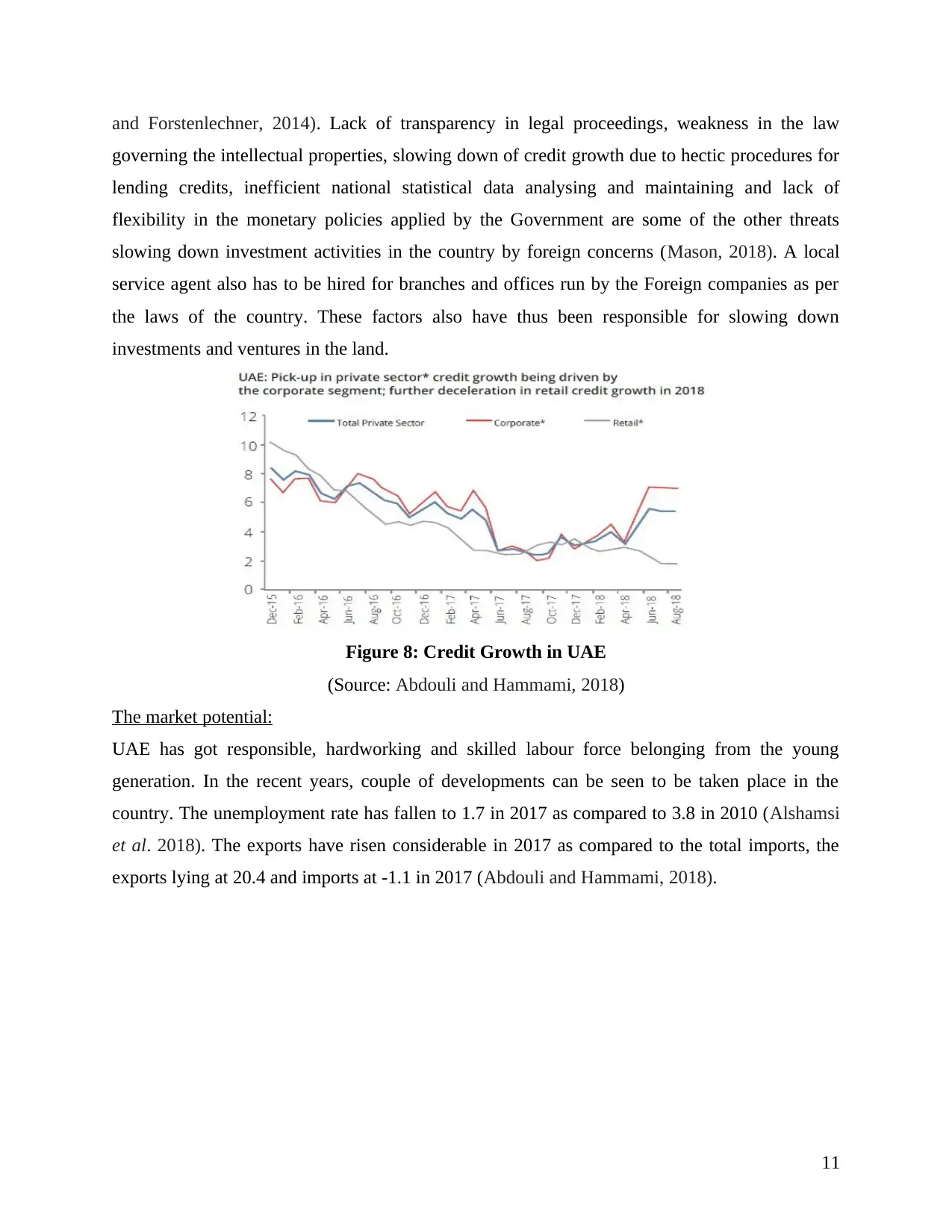
and Forstenlechner, 2014). Lack of transparency in legal proceedings, weakness in the law
governing the intellectual properties, slowing down of credit growth due to hectic procedures for
lending credits, inefficient national statistical data analysing and maintaining and lack of
flexibility in the monetary policies applied by the Government are some of the other threats
slowing down investment activities in the country by foreign concerns (Mason, 2018). A local
service agent also has to be hired for branches and offices run by the Foreign companies as per
the laws of the country. These factors also have thus been responsible for slowing down
investments and ventures in the land.
Figure 8: Credit Growth in UAE
(Source: Abdouli and Hammami, 2018)
The market potential:
UAE has got responsible, hardworking and skilled labour force belonging from the young
generation. In the recent years, couple of developments can be seen to be taken place in the
country. The unemployment rate has fallen to 1.7 in 2017 as compared to 3.8 in 2010 (Alshamsi
et al. 2018). The exports have risen considerable in 2017 as compared to the total imports, the
exports lying at 20.4 and imports at -1.1 in 2017 (Abdouli and Hammami, 2018).
11
governing the intellectual properties, slowing down of credit growth due to hectic procedures for
lending credits, inefficient national statistical data analysing and maintaining and lack of
flexibility in the monetary policies applied by the Government are some of the other threats
slowing down investment activities in the country by foreign concerns (Mason, 2018). A local
service agent also has to be hired for branches and offices run by the Foreign companies as per
the laws of the country. These factors also have thus been responsible for slowing down
investments and ventures in the land.
Figure 8: Credit Growth in UAE
(Source: Abdouli and Hammami, 2018)
The market potential:
UAE has got responsible, hardworking and skilled labour force belonging from the young
generation. In the recent years, couple of developments can be seen to be taken place in the
country. The unemployment rate has fallen to 1.7 in 2017 as compared to 3.8 in 2010 (Alshamsi
et al. 2018). The exports have risen considerable in 2017 as compared to the total imports, the
exports lying at 20.4 and imports at -1.1 in 2017 (Abdouli and Hammami, 2018).
11
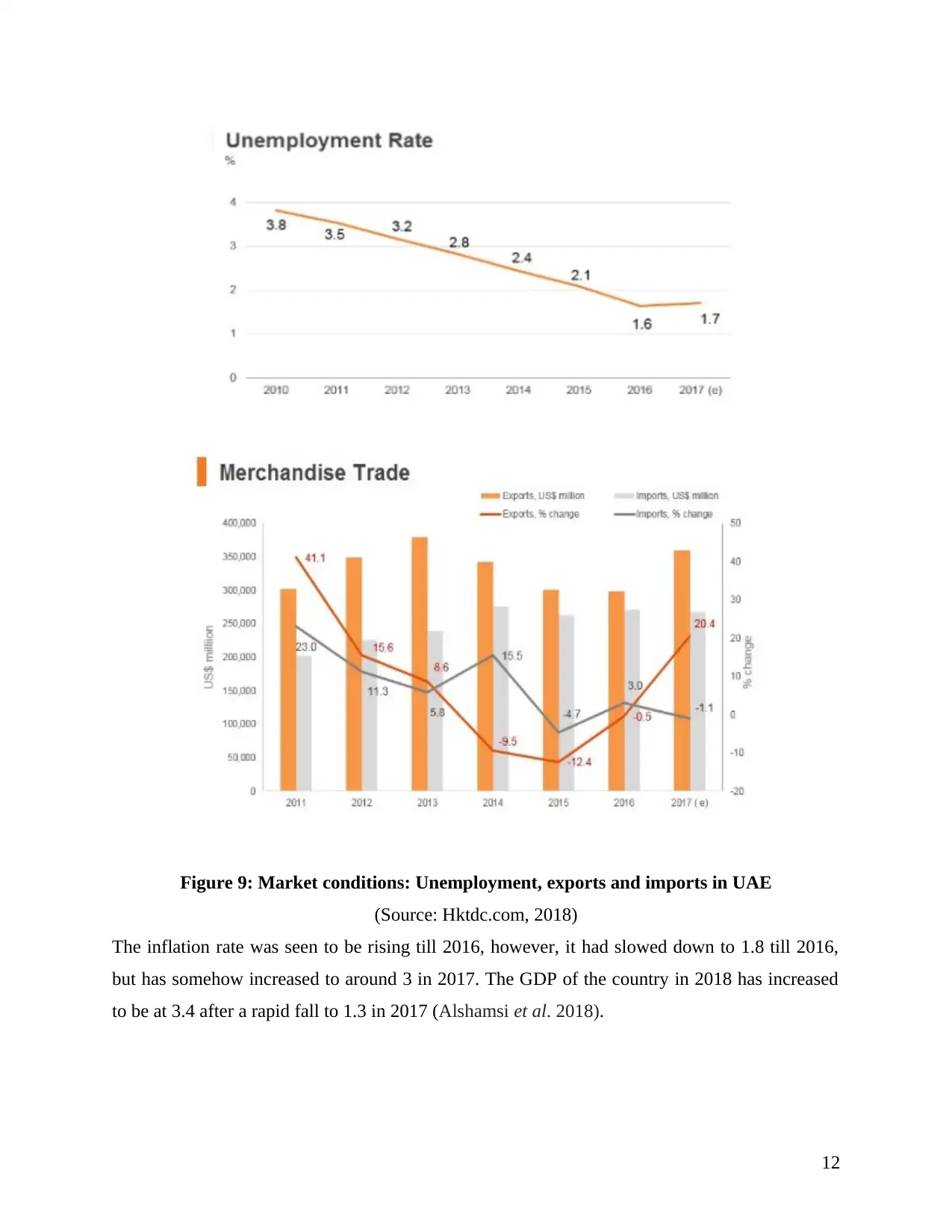
Figure 9: Market conditions: Unemployment, exports and imports in UAE
(Source: Hktdc.com, 2018)
The inflation rate was seen to be rising till 2016, however, it had slowed down to 1.8 till 2016,
but has somehow increased to around 3 in 2017. The GDP of the country in 2018 has increased
to be at 3.4 after a rapid fall to 1.3 in 2017 (Alshamsi et al. 2018).
12
(Source: Hktdc.com, 2018)
The inflation rate was seen to be rising till 2016, however, it had slowed down to 1.8 till 2016,
but has somehow increased to around 3 in 2017. The GDP of the country in 2018 has increased
to be at 3.4 after a rapid fall to 1.3 in 2017 (Alshamsi et al. 2018).
12
⊘ This is a preview!⊘
Do you want full access?
Subscribe today to unlock all pages.

Trusted by 1+ million students worldwide
1 out of 27
Related Documents
Your All-in-One AI-Powered Toolkit for Academic Success.
+13062052269
info@desklib.com
Available 24*7 on WhatsApp / Email
![[object Object]](/_next/static/media/star-bottom.7253800d.svg)
Unlock your academic potential
Copyright © 2020–2025 A2Z Services. All Rights Reserved. Developed and managed by ZUCOL.





